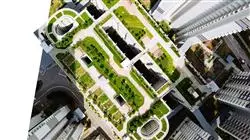University certificate
The world's largest faculty of engineering”
Introduction to the Program
Do not miss the opportunity to join the most important urban change of the last decades, deepening properly in Urban Ecosystem Services"

The cities of the future are destined to be sustainable urban spaces, with a detailed focus on issues such as energy efficiency, resilient green infrastructures or agro-ecosystems linked to sustainability. These are areas of specialization in constant adaptation and evolution, as urban challenges and proposals progress at the same pace as technological and ideological advances in society.
Therefore, a situation has arisen in which architects and engineers specialized in the Resilience of Cities through Urban Ecosystem Services will be the best positioned to take on large-scale urban projects. This justifies the creation of this Postgraduate diploma, which compiles both the practical tools and the most relevant architectural postulates in urban planning. Upon graduation, students will be able to distinguish themselves as advanced specialists in the field of planning environmentally friendly cities and towns.
The nature of the program also greatly favors its flexibility, dispensing with on-site classes and fixed schedules. On the contrary, it is the students themselves who have the ability to decide when, where and how to take on the entire course load. To this end, all content is available in 100% online format and can be accessed from any device with an Internet connection.
Access the entire syllabus from the comfort of your smartphone, tablet or computer of choice"
This Postgraduate diploma in Resilience of Cities through Urban Ecosystem Services contains the most complete and up-to-date educational program on the market. The most important features include:
- The development of case studies presented by experts in Design of Sustainable Green Infrastructures
- The graphic, schematic, and practical contents with which they are created, provide practical information on the disciplines that are essential for professional practice
- Practical exercises where self-assessment can be used to improve learning
- Its special emphasis on innovative methodologies
- Theoretical lessons, questions to the expert, debate forums on controversial topics, and individual reflection assignments
- Content that is accessible from any fixed or portable device with an Internet connection
Analyzes in detail the economics of ecosystems and sustainable urban planning, taking into account social, urban and financial aspects"
The program’s teaching staff includes professionals from the sector who contribute their work experience to this educational program, as well as renowned specialists from leading societies and prestigious universities.
Its multimedia content, developed with the latest educational technology, will provide the professionals with situated and contextual learning, i.e., a simulated environment that will provide an immersive education programmed to learn in real situations.
The design of this program focuses on Problem-Based Learning, by means of which the professionals must try to solve the different professional practice situations that are presented throughout the academic course. For this purpose, the students will be assisted by an innovative interactive video system created by renowned experts.
Distribute the teaching load as it best suits you at all times, having flexibility and absolute freedom to adapt it to your own pace"

You will have a privileged contextualization of each topic covered through practical analysis of green infrastructure design and planning"
Why study at TECH?
TECH is the world’s largest online university. With an impressive catalog of more than 14,000 university programs available in 11 languages, it is positioned as a leader in employability, with a 99% job placement rate. In addition, it relies on an enormous faculty of more than 6,000 professors of the highest international renown.

Study at the world's largest online university and guarantee your professional success. The future starts at TECH”
The world’s best online university according to FORBES
The prestigious Forbes magazine, specialized in business and finance, has highlighted TECH as “the world's best online university” This is what they have recently stated in an article in their digital edition in which they echo the success story of this institution, “thanks to the academic offer it provides, the selection of its teaching staff, and an innovative learning method aimed at educating the professionals of the future”
A revolutionary study method, a cutting-edge faculty and a practical focus: the key to TECH's success.
The most complete study plans on the university scene
TECH offers the most complete study plans on the university scene, with syllabuses that cover fundamental concepts and, at the same time, the main scientific advances in their specific scientific areas. In addition, these programs are continuously being updated to guarantee students the academic vanguard and the most in-demand professional skills. In this way, the university's qualifications provide its graduates with a significant advantage to propel their careers to success.
TECH offers the most comprehensive and intensive study plans on the current university scene.
A world-class teaching staff
TECH's teaching staff is made up of more than 6,000 professors with the highest international recognition. Professors, researchers and top executives of multinational companies, including Isaiah Covington, performance coach of the Boston Celtics; Magda Romanska, principal investigator at Harvard MetaLAB; Ignacio Wistumba, chairman of the department of translational molecular pathology at MD Anderson Cancer Center; and D.W. Pine, creative director of TIME magazine, among others.
Internationally renowned experts, specialized in different branches of Health, Technology, Communication and Business, form part of the TECH faculty.
A unique learning method
TECH is the first university to use Relearning in all its programs. It is the best online learning methodology, accredited with international teaching quality certifications, provided by prestigious educational agencies. In addition, this disruptive educational model is complemented with the “Case Method”, thereby setting up a unique online teaching strategy. Innovative teaching resources are also implemented, including detailed videos, infographics and interactive summaries.
TECH combines Relearning and the Case Method in all its university programs to guarantee excellent theoretical and practical learning, studying whenever and wherever you want.
The world's largest online university
TECH is the world’s largest online university. We are the largest educational institution, with the best and widest online educational catalog, one hundred percent online and covering the vast majority of areas of knowledge. We offer a large selection of our own degrees and accredited online undergraduate and postgraduate degrees. In total, more than 14,000 university degrees, in eleven different languages, make us the largest educational largest in the world.
TECH has the world's most extensive catalog of academic and official programs, available in more than 11 languages.
Google Premier Partner
The American technology giant has awarded TECH the Google Google Premier Partner badge. This award, which is only available to 3% of the world's companies, highlights the efficient, flexible and tailored experience that this university provides to students. The recognition as a Google Premier Partner not only accredits the maximum rigor, performance and investment in TECH's digital infrastructures, but also places this university as one of the world's leading technology companies.
Google has positioned TECH in the top 3% of the world's most important technology companies by awarding it its Google Premier Partner badge.
The official online university of the NBA
TECH is the official online university of the NBA. Thanks to our agreement with the biggest league in basketball, we offer our students exclusive university programs, as well as a wide variety of educational resources focused on the business of the league and other areas of the sports industry. Each program is made up of a uniquely designed syllabus and features exceptional guest hosts: professionals with a distinguished sports background who will offer their expertise on the most relevant topics.
TECH has been selected by the NBA, the world's top basketball league, as its official online university.
The top-rated university by its students
Students have positioned TECH as the world's top-rated university on the main review websites, with a highest rating of 4.9 out of 5, obtained from more than 1,000 reviews. These results consolidate TECH as the benchmark university institution at an international level, reflecting the excellence and positive impact of its educational model.” reflecting the excellence and positive impact of its educational model.”
TECH is the world’s top-rated university by its students.
Leaders in employability
TECH has managed to become the leading university in employability. 99% of its students obtain jobs in the academic field they have studied, within one year of completing any of the university's programs. A similar number achieve immediate career enhancement. All this thanks to a study methodology that bases its effectiveness on the acquisition of practical skills, which are absolutely necessary for professional development.
99% of TECH graduates find a job within a year of completing their studies.
Postgraduate Diploma in Resilience of Cities through Urban Ecosystem Services
Resilience of cities refers to the capacity of cities to adapt and recover from challenges and crises they may face, such as natural, economic or social disasters. Urban ecosystem services can play an important role in increasing the resilience of cities by providing services that can help prevent or reduce the impacts of these challenges.
The resilience of cities can be enhanced through the management and conservation of urban ecosystems. For example, conservation of urban wetlands can reduce flood risk and improve water quality, which helps prevent the negative impacts of extreme weather events. Similarly, proper management of trees and vegetation can also provide significant benefits to the resilience of cities, such as temperature regulation and storm protection.
In addition to providing specific ecosystem services, investment in green infrastructure can improve overall city resilience, helping to prevent negative impacts from challenges that may arise in the future. For example, a well-designed network of green spaces and green corridors can improve city connectivity and provide a safe and accessible way to access essential services in the event of an emergency.
The management and conservation of urban ecosystem services can provide a number of benefits to the resilience of cities, helping to reduce the impact of short- and long-term crisis and challenges. By making cities more resilient, they can improve residents' quality of life and ensure their safety.
Be a university expert in city resilience through urban ecosystem services, gain specialized skills and knowledge on how the conservation and management of urban ecosystems can improve the ability of cities to adapt and recover from the impacts of challenges and crises.







